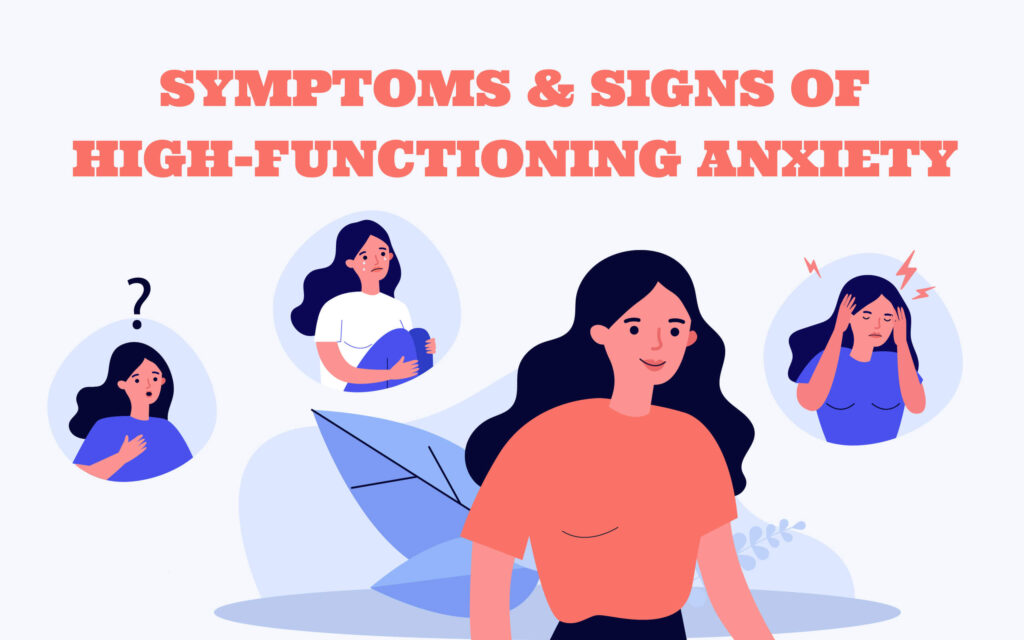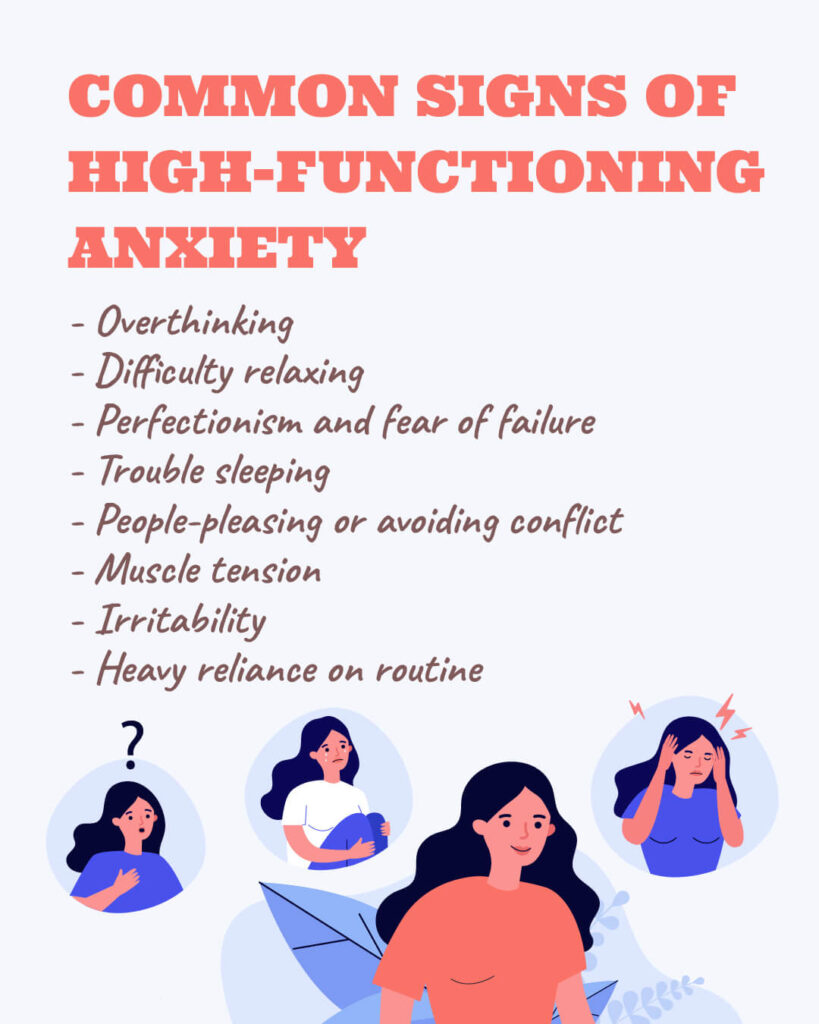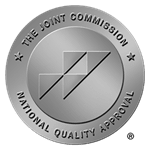Symptoms & Signs of High-functioning Anxiety
Anxiety doesn’t always show up as panic attacks or visible distress. Sometimes it hides behind achievement, busyness, and an outward sense of calm – which is often the case with high-functioning anxiety.
You might be meeting deadlines, showing up for others, and getting things done, yet underneath it all, there’s a constant hum of worry, tension, or self-doubt. It’s the kind of anxiety that doesn’t always draw attention but can take a real toll over time.
Below, we’re taking a closer look at what high-functioning anxiety actually is, how it can affect day-to-day life, and what can help bring relief.
What is High-functioning Anxiety?
High-functioning anxiety is a subset of generalized anxiety disorder that often goes unnoticed or undiagnosed. Those suffering from high-functioning anxiety often appear successful, organized, and dependable, but inside they may be battling persistent worry, self-doubt, or fear of failure.
What separates high-functioning anxiety from more visible forms of anxiety is how it shows up. From the outside, everything appears to be in order – work gets done, commitments are honored, and routines are maintained. Many people with high-functioning anxiety present as calm, capable, and even overachieving, often going above and beyond to meet expectations and avoid letting others down.
This outward success, however, can be deceiving. The anxiety is still there, driving the constant motion and internal pressure. It hides behind productivity and perfectionism, making it easy to overlook, and even harder to ask for help.
Signs of High-functioning Anxiety
High-functioning anxiety often hides behind habits that look productive or even admirable. But beneath the surface, these patterns are driven by worry, self-doubt, and pressure to perform.
Here are some of the most common signs of high-functioning anxiety:
- Overthinking or replaying conversations
- Difficulty relaxing or switching off
- Perfectionism and fear of failure
- Trouble falling or staying asleep
- People-pleasing or avoiding conflict
- Muscle tension, jaw clenching, or stomach discomfort
- Procrastination followed by last-minute productivity bursts
- Irritability or feeling on edge
- Harsh self-talk and criticism
- Relying heavily on routines to feel stable
Many of these traits might be mistaken for ambition or dedication – but when they’re fueled by anxiety, they can become draining and unsustainable.
How Anxiety Manifests in High-functioning Individuals
High-functioning anxiety often doesn’t show up in isolated symptoms. Instead, it weaves itself into how you move through the day. Over time, the anxiety can feel less like a disruption and more like a default mode, one that keeps you constantly pushing, proving, or preparing.
In everyday life, that might look like:
- Keeping your schedule packed to avoid stillness or discomfort
- Taking on too much because saying no feels risky or makes you feel guilty
- Obsessing over small mistakes or feeling like nothing is ever quite enough
- Struggling to rest, even when your body and mind are exhausted
- Skipping celebrations because you’re already fixated on the next goal
- Believing your success depends on maintaining impossible standards
From the outside, everything may appear fine. But on the inside, you’re managing a steady stream of tension that never quite lets up.
How to Manage High-functioning Anxiety
Living with high-functioning anxiety can be exhausting, but it’s also something you don’t have to navigate alone. Healing can come from a mix of tools and small shifts that help calm your nervous system and reshape how you relate to stress, productivity, and yourself.
While there’s no one-size-fits-all solution, there are several approaches that many people find helpful:
-
Therapy
Working with a professional therapist can help you identify the patterns that feed your anxiety. Modalities like Cognitive Behavioral Therapy (CBT) and mindfulness-based approaches can provide support by helping you develop healthier thought patterns and coping strategies over time.
-
Medication
Some people find relief through anti-anxiety or antidepressant medications, especially when symptoms are interfering with daily life. When paired with therapy or other support, medication can offer a more stable foundation for healing and growth.
-
Mindfulness and Breathwork
Grounding practices like breathwork or meditation can calm your nervous system and create more space between stimulus and response. Over time, these tools can help you shift out of constant reactivity and into a more centered state of awareness.
-
Lifestyle Changes
Small shifts in sleep, nutrition, movement, and screen time can make a big difference, as can creating boundaries around your time and energy. These habits build a stronger foundation for emotional regulation and help reduce the overwhelm that fuels high-functioning anxiety.
-
Find a Support Network
Being part of a group or connecting with others who understand what you’re going through can offer reassurance and encouragement. Community helps remind you that you’re not alone, and that healing becomes more possible when it’s shared.
Anxiety Treatment in Orange County, California
If high-functioning anxiety is making it hard to rest, connect, or feel at ease in your own life, our team at Barn Life Recovery is here to help! We offer compassionate, integrative care that helps you move from survival mode into a more sustainable state of being. Contact us to learn more about our anxiety treatment programs and take the first step toward loving life again.











